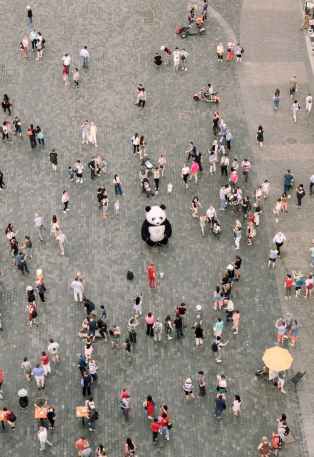I wish I could live in Montreal. That’s the thought which frequently
enters my mind. Yet I don’t know why it should be Montreal for myself.
As a person who was born and grew up in Japan, I had had only a little
vague knowledge of it as an Olympic venue of ancient before until I
first visited it. I even didn’t choose it as my travel destination for
the city itself. I’m an avid Formula One race fan and had been looking
for an alternative race to go to see other than the one held in Japan
that was too costly and poorly managed. The circuit with the most
convenient access from a downtown hotel was located in Montreal, that
was the simple reason I chose to go there and a start of my love for the
city.
Twenty hours later after I left my apartment in Tokyo, I got
off the airport bus in downtown Montreal past midnight. I was headed
with my partner for the hotel I had booked that was a 10-minute walk
away. My Japanese acquaintance has once told me that he got mugged in
downtown Los Angeles and was robbed of his wallet, shoes, and even a
tooth capped with gold. I recalled it and thought I was doing the
stupidest thing to walk pulling my big suitcase in a strange city, in
the witching hour of night. Then I saw someone while I was waiting for
the traffic lights at a quiet crossing. A teen-age girl wearing a mini
skirt appeared from nowhere and crossed the street humming merrily and
dancing ballet. The sight of her gave me a sense that Montreal might be a
safe, relaxing and enjoyable city. And it proved true.
I had lived
in Southern California for four years before and I imagined that
Montreal was quite alike since it was also in North America. But
actually, it turned out to be a totally different place. Virtually
everything – people’s appearances, values, the way of living and a
cityscape – was far from alike. When I lived in California, I believed
that life is a competition and that a happy life can’t be attained
without success. I had been all worn up with that belief. My work as a
singer-songwriter didn’t go well accordingly and I ended up moving back
to Japan for a financial difficulty, broken-heartedly. But Montreal’s
beautiful cityscape and its fashionable locals who enjoy life not with
caring about money but with a laid-back attitude healed me. I fell in
love in this city deeply enough to stay for a long period of time
repeatedly.

Of course familiar flaws and problems existed since it’s not heaven. I
too much often received a wrong change when shopping. One shop clerk
surprised me when he gave me a handful of change without counting. He
saw my dubious face and added one more handful of coins. I was also
surprised that ordinary-looking people begged for small change. A young
woman who seemed to be an ordinary house wife asked me to spare change
while she was pushing a stroller with a baby in it. Or a bunch of young
decent boys asked for change casually while they were having fun talking
and laughing on the street. I glared at them for caution when I passed
by, and they apologized to me. It seemed like it was their custom or
routine to ask for money in passing. I wondered why they would do so in
the city that didn’t look jobless nor degenerate. Come to think of it, I
had spotted people idling and just sitting on the steps to an apartment
in the daytime so many times. Commute traffic jammed at as early as 4
p.m. which looked so odd to a Japanese in whose country the train around
midnight is running full with commuters. While I appreciated the city’s
peacefulness with no tension of racism or success, its too-easy-going
atmosphere sometimes irritated me. But it was probably too much of a
luxury to ask for more. Before I was aware, I wished to settle in
Montreal and work on my music there. My wish was to be crushed
afterwards however, because reality was harsh.
I remember my happy
days in Montreal every time I watch Canadian GP on TV. The city’s
skyscrapers over the circuit ask me through the TV screen if I can come
back someday. I desperately cheer myself up, telling myself that I can, I
want to, I’m supposed to. On one Canada Day in the future, while I’m
watching the mega-sized fireworks at the head of the Old Montreal pier
with my partner, my eyes will be filled with light and shed tears of
joy.



